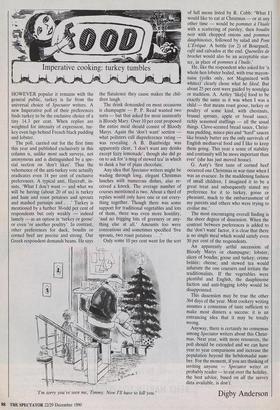Imperative cooking: turkey tumbles
HOWEVER popular it remains with the general public, turkey is far from the universal choice of Spectator writers. A new Imperative poll of their preferences finds turkey to be the exclusive choice of a tiny 14.3 per cent. When replies are weighted for intensity of expression, tur- key even lags behind French black pudding and lobster.
The poll, carried out for the first time this year and published exclusively in this column is, unlike most such surveys, not anonymous and is distinguished by a spe- cial section on 'don't likes'. Thus the vehemence of the anti-turkey vote actually eradicates even 14 per cent of exclusive preferences. A typical anti, Haycraft, in- sists, 'What I don't want — and what we will be having (about 20 of us) is turkey and ham and roast potatoes and sprouts and mashed parsnips and . . .' Turkey is mentioned by a further 30-odd per cent of respondents but only weakly — indeed lamely — as an option in 'turkey or goose' or even 'or another poultry'. In contrast, other preferences for duck, boudin or corned beef are precise and strong. Our Greek respondent demands beans. He says the flatulence they cause makes the chil- dren laugh.
The drink demanded on most occasions is champagne — P. P. Read wanted two sorts — but that asked for most insistently is Bloody Mary. Over 10 per cent proposed the entire meal should consist of Bloody Marys. Again the 'don't want' section what pollsters call dispreference rating was revealing. A B. Bainbridge was apparently clear, 'I don't want any drinks except fizzy lemonade', though she did go on to ask for 'a mug of stewed tea' in which to dunk a bar of plain chocolate.
Any idea that Spectator writers might be wading through long, elegant Christmas lunches with numerous dishes, also re- ceived a knock. The average number of courses mentioned is two. About a third of replies would only have one or eat every- thing together. Though there was some support for traditional vegetables and lots of them, there was even more hostility, 'and no frigging bits of greenery or any- thing else at all.' Amounts too were contentious and sometimes specified 'five sprouts, two roast potatoes . .
Only some 10 per cent went for the sort 'I'm sorry you've seen me, Timmy. Now I'll have to kill you.' of full menu listed by R. Cobb: 'What I would like to eat at Christmas — or at any other time — would be pommes a l'huile with a scattering of parsley, then boudin noir with chopped onions and pommes dauphinoises, followed by salad and Pont L'Eveque. A bottle (or 2) of Bourgueil, cafe and calvados at the end. Quenelles de brochet would also be an acceptable star- ter, in place of pommes a l'huile.'
He, like the respondent who asked for 'a whole hen lobster boiled, with true mayon- naise (yolks only, not Magimixed with whites)' clearly chose what he liked. But about 25 per cent were guided by nostalgia or tradition. A. Artley 'like[s] food to be exactly the same as it was when I was a child — that means roast goose, turkey or poultry of some kind, with chestnuts, brussel sprouts, apple or bread sauce, richly seasoned stuffings — all the usual things. Clove-scented bread sauce, Christ- mas pudding, mince pies and "hard" sauces like brandy butter are the only survivals of English mediaeval food and I like to keep them going. This year a sense of stability and continuity will be more important than ever' (she has just moved house).
G. Auty's 'first taste of corned beef occurred one Christmas in war-time when I was an evacuee. In the maddening fashion of small children, I imagined it to be a great treat and subsequently stated my preference for it to turkey, goose or pheasant, much to the embarrassment of my parents and others who were trying to civilise me.'
The most encouraging overall finding is the sheer degree of dissension. When the contrast between preferences is added to the 'don't want' factor, it is clear that there is no single meal which would satisfy even 30 per cent of the respondents.
An apparently artful succession of Bloody Marys or champagne; lobster; slices of boudin; goose and turkey; crème bralee; cheese; and stewed tea would infuriate the one coursers and irritate the traditionalists. If the vegetables were plentiful and English, the dauphinoise faction and anti-frigging lobby would be disappointed.
This dissension may be true the other 364 days of the year. Most cookery writing assumes a consensus of taste sufficient to make most dinners a success: it is an entrancing idea that it may be totally wrong.
Anyway, there is certainly no consensus among Spectator writers about this Christ- mas. Next year, with more resources, the poll should be extended and we can have year to year comparisons and increase the population beyond the hebdomadal num- ber. For the moment, if you are thinking of inviting anyone — Spectator writer or probably reader — to eat over the holiday, the best advice, based on all the survey data available, is don't.
Digby Anderson


































































































 Previous page
Previous page